Loading
Search
▼ 9 Tips for Living with a Japanese Host Family
- Category:Stay
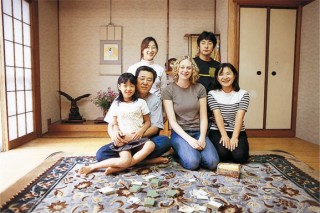
Go Overseas
Spending time with a homestay family is one of the best cultural immersion experiences you can have while traveling in Japan. Whether you're studying abroad for a semester, or exploring Japan for a few weeks, be sure to take a weekend and live with a Japanese family.
Japanese people are some of the kindest individuals in the world. They love introducing the world to their vibrant culture, and sharing their homes with travelers from all over the globe. Japan is also one of the safest countries in the world, making it the perfect opportunity to live with locals.
That said, Japan also has a strong culture that can be intimidating and at times difficult to navigate for foreigners. When do you remove your shoes? How do you bow properly? What's the deal with all the buttons on the toilet? To be a good homestay guest there are many important things you need to know.
That's why we at Go Overseas have compiled a list of 9 tips for staying with a homestay family in Japan:
1. Take Off Your Shoes Indoors!
Japanese people never wear shoes inside their home. When you enter a Japanese household, there will usually be a designated place by the door to put your shoes.Once you've removed your shoes, there will typically be house slippers you will wear while inside. The only exception are rooms with straw mat floors, in which case you'll go barefoot.
The bathroom will have separate slippers from the main room. When you enter the bathroom, be sure to put on these designated slippers.
Definitely don't forget to take these slippers off when leaving the bathroom either! It's one of the worst etiquette mistakes you can make while traveling in Japan.
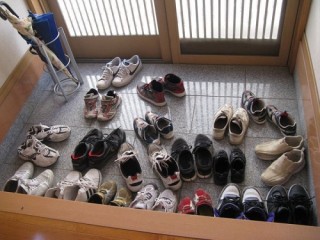
2. Don't Forget a Gift
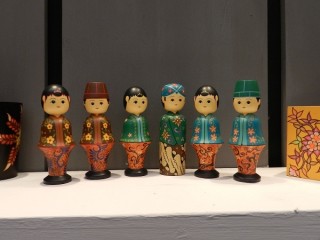
Even if you pay your host for the experience of a homestay, you should still be sure to bring a small gift. The best gifts are small, inexpensive tokens that represent your home country.
If you're from Australia, bring a mini stuffed koala. Are you from London? Buy a Big Ben keychain. You can even bring a few candy bars, specialty treats (like coffee or tea), or postcards from your home country. If you know there will be kids, bring something small and special for them. If you're from the U.S., consider bringing a baseball cap from your home baseball team. The Japanese LOVE baseball!
Food and drinks can be fun as well. For example, why not bring pancake mix and maple syrup to give your host family a true "taste" of your home country?
3. Expect to Be Busy
The Japanese don't take the responsibility of a homestay lightly.Expect to be constantly entertained from the moment you walk in the door. Your family will most likely be very excited to introduce you to their city and Japanese culture. They may take you around town, to a nice restaurant or even hiking outside the city.
Embrace the attention and their eagerness to share -- after all, one of the best aspects of living with a homestay family is the ability to explore Japan with your host and listen to what they have to share about their culture.
You may be exhausted and overwhelmed by the attention and activities, but you'll be sure to have fond memories when you leave. Just be sure to take part in all the activities and at least try to eat any food they offer you!
4. If You Speak Japanese, Push Yourself to Practice

While some homestays speak English, others do not -- which is fantastic if you're there to learn Japanese abroad.
No matter what your level, try to push yourself to spend a weekend with a family that doesn't speak English. It may be intimidating to fully immerse yourself in the language, but you should definitely give it a try.
Japanese people are always excited to share their language with others, and they will most likely be amazed you can speak any of the language at all. Even if you don't speak any Japanese, try to pick up a few Japanese phrases before you arrive. You'll be sure to impress your hosts!
5. Don't Shower in the Bathtub

In Japan, you'll often find there's a shower head outside the bathtub. Do NOT use the shower head to wash yourself inside the tub!
In Japan, bathtubs are meant to be used after you have washed your body.
Typically the whole family uses the same bathwater for a soak. Don't worry, these technologically advanced tubs have heaters to keep the water warm!
As a guest, you'll most likely be asked to take the first bath, usually before dinner. To show respect to your family, take them up on their offer. Just be sure to wash yourself very throughly before you enter the tub, because the rest of your family will be washing in the same water after you!
6. Enjoy the Robot Toilet
On a similar note, Japanese toilets are famous for their technological advancement. Most toilets in Japanese households have a crazy amount of buttons. These can range from toilet seat warmers to squirting water up your behind!Take my advice and give each button a try for a nice little surprise
Hey, it's a cultural experience!

7. Japanese Apartments Are Tiny

Entering Japan sometimes feels like living in a mini-world, where everything is half the size you're used to. From capsule hotels to cramped apartments, the living space in Japan is small. There's usually a reason why Japanese people use sliding doors in their home. There may not be enough room for a door to fully open!
Living with the homestay family, you may not have an actual bed. Instead, expect a folded mattress, blankets and pillows that you can set up in the evenings. Also, many Japanese don't have spare bedrooms. Because of this, you'll probably be sleeping in the living room. It's all part of the experience!
8. Don't Forget Your Table Manners
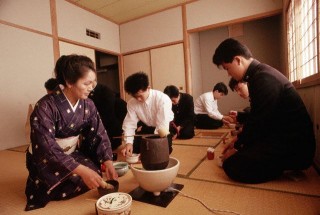
With such vastly different etiquette from home, it can be difficult to know if you're being polite in Japan. From table manners to the Japanese version of "cheers!", here's the main points you need to know:
- Wait for everyone to be served before you take a sip from your glass. Usually the host will yell "Kanpai!" which means "Cheers!"
- The small wet cloth given to you at most restaurants is used to wash your hands before eating. Once you're done, fold it and set it aside. Do not use it as a napkin or touch it to your face.
- When eating ramen, be sure to slurp your noodles! Honestly, it's considered polite in Japan because it shows you're enjoying the food.
- You may pick your bowl of rice off the table and hold it closely to your mouth, especially if you're worried about your chopstick skills.
- Be sure to say "itadakimasu" with a slight bow before you dig in. It basically means "thank you for this food". This isn't a "thank you" to your host, but actually just thanks in general that you are fortunate enough to have food to eat.
9. Learn How to Bow
Bowing customs in Japan are extremely complicated. Most Japanese people do not expect foreigners to understand the intricate rules of bowing, but a little effort goes a long way. Usually the less respected person bows longer and deeper, but this is a very complex equation for most visitors.A general rule of thumb is to follow the lead of the person bowing to you, and only bow once. Definitely do not "over bow" and make a show of bowing longer and deeper. This can be very offensive if someone is trying to show respect to you.
In general, men should bow from the waist and hold their hands straight at their sides. Your back should remain straight, and you should not bow more than 45 degrees
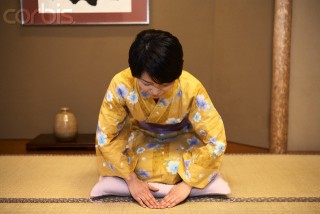
Female bows are the same, with the exception of the hands. Women should place their hands in a "fig leaf posture" (hands folded, covering your privates like the fig leaf in the statue of David). As a foreigner, you'll never quite learn how to bow properly, but any effort is greatly appreciated.
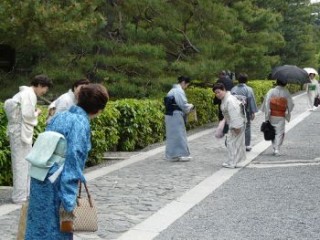
While it may be scary to navigate cultural differences and spend time with a family from another country, a homestay in Japan is one of the most meaningful experience you can have in the country. Expand your boundaries and comfort zone and give life in a Japanese family a try. You'll come away with an immense appreciation for Japanese culture and hopefully a lifelong friendship.
Source : gooverseas.com
- August 25, 2015
- Comment (0)
- Trackback(0)

